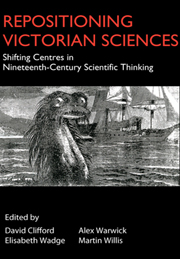Book contents
- Frontmatter
- Contents
- Notes on Contributors
- 1 Margins and Centres
- SECTION I Shifted Centres
- 2 ‘Speakers Concerning the Earth’: Ruskin's Geology After 1860
- 3 Swimming at the Edges of Scientific Respectability: Sea Serpents in the Victorian Era
- 4 ‘The Drugs, The Blister and the Lancet are all Laid Aside’: Hydropathy and Medical Orthodoxy in Scotland, 1840–1900
- 5 Anna Kingsford: Scientist and Sorceress
- 6 A Science for One or a Science for All? Physiognomy, Self-Help, and the Practical Benefits of Science
- SECTION II Contested Knowledges
- SECTION III Entering The Modern
- Notes
- Select Bibliography
2 - ‘Speakers Concerning the Earth’: Ruskin's Geology After 1860
from SECTION I - Shifted Centres
Published online by Cambridge University Press: 05 March 2012
- Frontmatter
- Contents
- Notes on Contributors
- 1 Margins and Centres
- SECTION I Shifted Centres
- 2 ‘Speakers Concerning the Earth’: Ruskin's Geology After 1860
- 3 Swimming at the Edges of Scientific Respectability: Sea Serpents in the Victorian Era
- 4 ‘The Drugs, The Blister and the Lancet are all Laid Aside’: Hydropathy and Medical Orthodoxy in Scotland, 1840–1900
- 5 Anna Kingsford: Scientist and Sorceress
- 6 A Science for One or a Science for All? Physiognomy, Self-Help, and the Practical Benefits of Science
- SECTION II Contested Knowledges
- SECTION III Entering The Modern
- Notes
- Select Bibliography
Summary
To read the geological work of John Ruskin from the early 1860s until the mid-1880s is to look at a marginalized science through the lens of a marginal – and, ultimately, marginalized – practitioner. The inception of the dense, professional Geological Magazine in 1864 does show that able work was being done by an increasingly self-aware international community. But while geology was not being practised less, its significance in Victorian scientific culture was diminishing. Not only the question of evolution, but questions about the nervous system, solar power, sociology and the relation between mind and body began to edge geology out of its former place. The science which had fed controversy about the age of the earth, the historical accuracy of the Bible and the origin and evolution of life began to shift to a science of filling informational gaps. Geology's leading practitioners certainly resisted being relegated to the sidelines. As the Oxford geologist John Phillips lectured to the British Association in 1864:
The age of geological discovery is, by many persons, thought to have passed away with Hutton and Werner, Humboldt and Von Buch, Smith and Cuvier, Conybeare and Buckland, Forbes and De la Beche … Yet in this very district, the most carefully examined perhaps of all the richly fossiliferous tracts of England, our friend Mr C Moore is finding a multitude of interesting forms of life of the later Triassic age … Nor is the practical application of our science less actively exercised.
- Type
- Chapter
- Information
- Repositioning Victorian SciencesShifting Centres in Nineteenth-Century Thinking, pp. 17 - 30Publisher: Anthem PressPrint publication year: 2006
- 2
- Cited by



